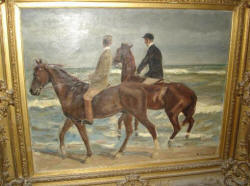|
 German
gov't knew of Munich art find for 19 months German
gov't knew of Munich art find for 19 months
 Send a link to a friend
Send a link to a friend
[November 16, 2013]
BERLIN (AP) — The German government
knew for 19 months that a huge trove of art, possibly including
works stolen by the Nazis, had been found in Bavaria, but kept quiet
while prosecutors carried out their investigation.
|
|
 Jewish groups and lawyers for heirs who might have a claim to the
works have criticized the secrecy surrounding the case, and the fact
that the government only sprang into action after it was revealed by
Germany media earlier this month. Jewish groups and lawyers for heirs who might have a claim to the
works have criticized the secrecy surrounding the case, and the fact
that the government only sprang into action after it was revealed by
Germany media earlier this month.
But since Focus magazine reported on the case Nov. 3, the government
has put together a specialist task force and urged prosecutors to
release details of some 590 items that may have been looted by the
Nazis — while stressing that it doesn't want to interfere in the
ongoing legal probe.
The government initially acknowledged only that it had been informed
about the case "for several months." But a spokesman for the
Bavarian Justice Ministry said Friday that federal officials were
told about the find on March 21 or 22, 2012 — less than a month
after some 1,406 pictures were discovered in a Munich apartment
following a tax investigation.

Hannes Hedke told The Associated Press that at the time a
representative of the Chancellery in Berlin was also handed a list
and photographs of the works seized "because there was a suspicion
early on that there might be goods involved that belonged to third
parties."
Legal experts have said that claims against Cornelius Gurlitt, the
collector in whose Munich apartment the paintings, prints and
drawings were found, could be hard to enforce because of Germany's
30-year statute of limitations.
[to top of second column] |

Bavaria's Justice Minister Winfried Bausback told the Sueddeutsche
Zeitung newspaper in an interview published Friday that it would be
"difficult to stomach" if the statute of limitations prevented heirs
from recovering their pictures, and suggested changes to the law
might be possible.
Michael Hulton, a doctor living in the United States, was able to
reach an out-of-court agreement with Gurlitt two years ago over the
sale of a Max Beckmann picture. The painting had once belonged to
his great-uncle, the late Jewish collector Alfred Flechtheim.
Hulton said if the trove now discovered in Munich contains more
items from the Flechtheim collection a similar deal might be
conceivable.
German government spokesman Steffen Seibert told reporters Friday
that the head of the task force set up to help investigate the works
would contact Gurlitt directly. The collector hasn't publicly said
whether he wants to have the paintings back.
[Associated
Press; FRANK JORDANS]
Copyright 2013 The Associated
Press. All rights reserved. This material may not be published,
broadcast, rewritten or redistributed.
 |